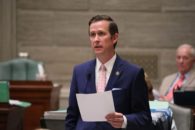JEFFERSON CITY, Mo. — In a two-hour long hearing, the House Economic Development Committee heard two of the four bills on prevailing wage on their docket.
Of the bills heard, one would exempt projects for a housing tax credit and the other would allow municipalities to opt out.
House Bill 1313 — sponsored by Rep. Bill White, R-Joplin— would prohibit the Missouri Housing Development Commission from requiring a prevailing hourly wage to be paid to a contractor on a project for a housing tax credit.
“This [bill] has been around for seven years,” White said. “It came about after the Joplin tornado.”
According the White, when contractors originally put in MHDC housing bids after the Joplin tornado they calculated it with the wrong prevailing wage and all had to re-submit their project bids.
“The projects changed, and not for the better,” said White, citing lower quality of materials and that single homes where reconfigured into duplexes. “When labor costs go up, you got to decrease the material costs.”
Rep. Doug Beck, D-St. Louis, pointed out that repealing prevailing wage doesn’t mean that costs go down, that there has been no studies that show that. He cited two counties in Kansas where constructions costs actually went up when prevailing wage was repealed.
“There is no pot of gold at end of rainbow for repealing prevailing wage,” Tim West, who owns his construction company, said. “Prevailing wage stabilizes the workforce, it stabilizes the wages in the area.”
Several others stepped up to testify against the bill — and all of the prevailing wage legislation on the committee’s docket. In fact, most opposed where is blanket opposition to all four bills and focused their testimony on the benefits of prevailing wage and the lack of benefit in offering exempts, or opt out opportunities.
“Prevailing wage makes contractors competitive,” Shannon Cooper, a representative with the Construction Employers Coalition, said. She recognized that modification is needed to the prevailing wage law but said that “repeal is not good for anyone in the state.”
White questioned the legality of requiring a prevailing wage on projects for a housing tax credit.
The prevailing wage serves as something of a minimum wage for construction workers on public construction projects ranging from minor upkeep, repairs and renovations to huge new schools, highways or other government buildings and construction projects.
The issue White pointed out was that these projects are not public projects or being used with public funds since a tax credit is considered a “pre-fund.”
White also brought up the fact that the current administration is not requiring MHDC projects to base compensation on prevailing wage — in part because the housing tax credit is not being offered — and he simply wants to make it permit.
The committee took no action on White’s bill nor the one sponsored by Charlie Davis, R-Webb City.
HB 1594 would allow municipalities to opt out of the prevailing wage law but would not include any federal jobs.
“This is a free market issue, a fairness issue,” Davis said.
According the Davis, prevailing wage prevents some cities from being able to afford to repair roads and other projects, such as rebuilding water towers.
An advocate for the City of Moberly stepped up in support of this bill — and the two that ended up not being heard — saying that prevailing wage hurts rural cities. When pressed, he could not provide any examples of a construction project Moberly was unable to do because of prevailing wage but said he would get back to the committee.
The committee did pass HB 1413 — sponsored by Rep. Jered Taylor, R-Nixa — in a 7-3 vote. The bill would require authorization for certain labor unions to use dues and fees to make political contributions and requires consent for withholding earnings from paychecks.
Two amendments — one to remove public safety employees from being exempt and one to define what a public employee is — failed in party-line votes.
“Today the House Economic Development Committee took a major step towards protecting Missouri workers from union overreach,” Brian Rogers, executive director of Missouri Rising, said in a news release. “For too long, labor unions have collected rising dues on the backs of hardworking Missourians without giving them voice on how their money is spent. HB 1413 will change that, finally making unions accountable to their members.”
The bill prevents any sum from being withheld from the earnings of a public employee for the payment of dues or agency shop fees to any public labor organization without the consent of the employee.
Additionally, no portion of the fees may be used to make political campaign contributions or expenditures without consent of the employee within the previous 12 months.
Some wording in the bill caused for questioning if it only applied to public employee. At the time of the hearing Taylor was unable to provide clarification of the language used included those in the private sector, too — which was not the intent of the bill.
Even so, the bill was referred to the Rules – Legislative Oversight Committee.

Alisha Shurr was a reporter for The Missouri Times and The Missouri Times Magazine. She joined The Missouri Times in January 2018 after working as a copy editor for her hometown newspaper in Southern Oregon. Alisha is a graduate of Kansas State University.






























